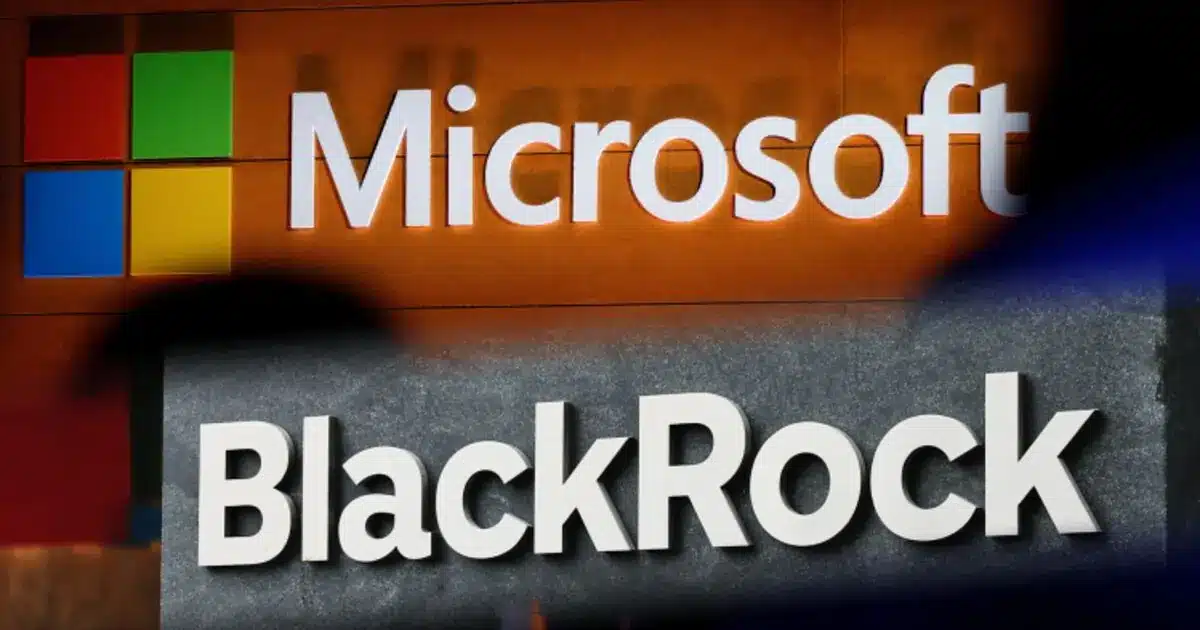In a move that could reshape the future of artificial intelligence (AI) infrastructure, BlackRock Inc. and Microsoft Corp. are collaborating on one of the largest private equity endeavors to date, targeting AI growth. The partnership, alongside the United Arab Emirates’ MGX investment vehicle, seeks to raise $30 billion in private equity capital. The venture, named the Global AI Infrastructure Investment Partnership, aims to leverage these funds to generate up to $100 billion in total investments, according to a statement made by the companies on Tuesday.
Pioneering AI-Driven Infrastructure
The funds will primarily go toward the build-out of data warehouses and energy infrastructure, which are critical to the booming AI industry. With AI poised to revolutionize numerous sectors—ranging from healthcare and finance to manufacturing—the need for robust data storage, computing power, and energy resources is unprecedented.
Larry Fink, BlackRock’s Chief Executive Officer, emphasized the scale of the task, remarking, “The need to build out data centers globally is multi-trillions of dollars to finance.” Fink explained that this investment project, which has been in development for several months, is a prime example of capital markets playing a vital role in facilitating infrastructure growth and advancing technological innovation. The proposed infrastructure projects will be primarily located in the United States, with a significant portion of funds also being funneled into U.S. partner countries.
Building the Future of AI
The Global AI Infrastructure Investment Partnership includes high-profile collaborators like Bayo Ogunlesi’s Global Infrastructure Partners and Nvidia Corp., which has been at the forefront of AI technology. Nvidia’s contribution to the partnership will revolve around its expertise in AI data centers, which have become pivotal for running AI algorithms and processing massive amounts of data.
Nvidia has already invested heavily in AI infrastructure by creating advanced software, networking tools, and other essential technology components that can rapidly assemble fully functional AI systems. The company’s work in AI chips has made it a critical player in powering AI products globally. These efforts align perfectly with the long-term objectives of the BlackRock-Microsoft partnership.
Brad Smith, Microsoft’s vice chairman and president, echoed the sentiment about the potential of AI, noting, “AI is the next general-purpose technology that will fuel growth across every sector of the economy both in the United States and abroad.” He emphasized the urgency of building infrastructure to match the demands of AI applications, ranging from business automation to complex problem-solving solutions.
Attracting Global Investors
The partnership’s ambitious target of $30 billion is just the beginning. The companies plan to attract additional investors, including pension funds and insurance firms, which are increasingly drawn to long-term infrastructure investments. According to Fink, raising the necessary capital “will not be a difficult task,” given the global appetite for stable, long-term investment opportunities in critical infrastructure projects.
MGX, an investment vehicle created by Abu Dhabi specifically for AI, will play a key role in securing funds from the Gulf region, known for its sovereign wealth funds and deep capital reserves. With the backing of such influential entities, the partnership is likely to gain substantial traction.
Addressing Power Demands
One of the largest hurdles AI infrastructure faces is the energy-intensive nature of data centers. AI data centers require enormous amounts of electricity to operate, and the demand is expected to increase significantly over the next few years. Bloomberg Intelligence projects that electricity usage by these facilities could surge as much as tenfold by 2030, which has prompted an urgent response from energy providers across the U.S.
To meet the growing demand, power companies are reconsidering their energy strategies. Many are delaying the planned retirements of coal and gas plants and are exploring new gas-fired plants. Simultaneously, there is a strong push to develop clean energy sources, such as solar and wind farms, to create a more sustainable energy grid for AI.
However, the race to expand energy production is fraught with delays. For instance, the time needed to connect new data centers to the grid in Virginia’s Data Center Alley has increased, sometimes extending up to seven years. Ogunlesi, who leads Global Infrastructure Partners, highlighted the need for faster energy development, stating, “Power generation in the U.S. has not been growing dramatically, so we will have to significantly increase the pace at which we develop new renewable power plants.”
Global Implications of AI Infrastructure Growth
The global AI race has sparked significant interest in the development of next-generation infrastructure, not only in the U.S. but also abroad. Countries like China, South Korea, and Japan are heavily investing in AI and computing infrastructure, recognizing that leadership in AI could determine future economic and technological dominance.
For example, China’s aggressive investment strategy in AI-related fields, including AI hardware, software, and data storage solutions, has made it one of the frontrunners in the race. In the context of the U.S. efforts led by BlackRock and Microsoft, there is an understanding that these investments are necessary not just to meet current AI demand, but to remain competitive on the global stage.
The ongoing U.S.-China tech rivalry has underscored the importance of not falling behind in key areas like AI infrastructure. With both nations competing to develop the most advanced AI capabilities, the success of this investment initiative could place the U.S. in a stronger position for years to come.
The Role of AI in Economic Growth
The rise of AI technologies is not just transforming industries but is also expected to contribute significantly to global economic growth. According to a PwC report, AI could contribute up to $15.7 trillion to the global economy by 2030, as industries worldwide integrate AI-driven automation, data analytics, and machine learning into their business models.
AI is increasingly being seen as a “general-purpose technology” akin to the steam engine or electricity, which means it has the potential to reshape virtually every sector. In sectors such as healthcare, finance, retail, and manufacturing, AI is already proving its value by driving efficiencies, reducing costs, and enabling new services.
With BlackRock and Microsoft leading one of the largest AI infrastructure investment projects, the duo aims to create the backbone necessary to support AI’s broad application. As AI technologies become more widespread, there is an increasing need for infrastructure that can handle enormous data processing requirements, support real-time decision-making, and offer scalable cloud-based solutions.
Collaboration with U.S. Lawmakers
Given the scale and impact of AI, it is no surprise that the firms involved have been in discussions with U.S. lawmakers and regulators. Microsoft’s Brad Smith confirmed that they have initiated talks about the regulatory frameworks that will be necessary to guide the responsible development and deployment of AI technologies. Such discussions are vital as AI continues to evolve at a pace that is outstripping current regulations.
This collaboration with regulators is key to ensuring that AI investments are aligned with public policy, particularly in areas such as data privacy, ethical AI use, and the energy consumption of AI infrastructure.
Looking Forward: The Next Phase of AI Expansion
As Microsoft continues to overhaul its entire product line to integrate AI, and BlackRock advances its infrastructure investment strategies, the partnership is expected to have far-reaching implications. In addition to building data centers, the investments will foster further collaboration between AI companies, investors, and governments, accelerating AI’s integration into the global economy.
The coming decade will likely see a continued surge in AI development, with infrastructure at the heart of this transformation. The $30 billion investment target is only the first step in what could be a much larger movement toward an AI-driven future, and BlackRock, Microsoft, MGX, and Nvidia are positioning themselves as leaders in this pivotal space.
photo source: Google
By: Montel Kamau
Serrari Financial Analyst
18th September, 2024
Article, Financial and News Disclaimer
The Value of a Financial Advisor
While this article offers valuable insights, it is essential to recognize that personal finance can be highly complex and unique to each individual. A financial advisor provides professional expertise and personalized guidance to help you make well-informed decisions tailored to your specific circumstances and goals.
Beyond offering knowledge, a financial advisor serves as a trusted partner to help you stay disciplined, avoid common pitfalls, and remain focused on your long-term objectives. Their perspective and experience can complement your own efforts, enhancing your financial well-being and ensuring a more confident approach to managing your finances.
Disclaimer: This article is for informational purposes only and does not constitute financial advice. Readers are encouraged to consult a licensed financial advisor to obtain guidance specific to their financial situation.
Article and News Disclaimer
The information provided on www.serrarigroup.com is for general informational purposes only. While we strive to keep the information up to date and accurate, we make no representations or warranties of any kind, express or implied, about the completeness, accuracy, reliability, suitability, or availability with respect to the website or the information, products, services, or related graphics contained on the website for any purpose. Any reliance you place on such information is therefore strictly at your own risk.
www.serrarigroup.com is not responsible for any errors or omissions, or for the results obtained from the use of this information. All information on the website is provided on an as-is basis, with no guarantee of completeness, accuracy, timeliness, or of the results obtained from the use of this information, and without warranty of any kind, express or implied, including but not limited to warranties of performance, merchantability, and fitness for a particular purpose.
In no event will www.serrarigroup.com be liable to you or anyone else for any decision made or action taken in reliance on the information provided on the website or for any consequential, special, or similar damages, even if advised of the possibility of such damages.
The articles, news, and information presented on www.serrarigroup.com reflect the opinions of the respective authors and contributors and do not necessarily represent the views of the website or its management. Any views or opinions expressed are solely those of the individual authors and do not represent the website's views or opinions as a whole.
The content on www.serrarigroup.com may include links to external websites, which are provided for convenience and informational purposes only. We have no control over the nature, content, and availability of those sites. The inclusion of any links does not necessarily imply a recommendation or endorsement of the views expressed within them.
Every effort is made to keep the website up and running smoothly. However, www.serrarigroup.com takes no responsibility for, and will not be liable for, the website being temporarily unavailable due to technical issues beyond our control.
Please note that laws, regulations, and information can change rapidly, and we advise you to conduct further research and seek professional advice when necessary.
By using www.serrarigroup.com, you agree to this disclaimer and its terms. If you do not agree with this disclaimer, please do not use the website.
www.serrarigroup.com, reserves the right to update, modify, or remove any part of this disclaimer without prior notice. It is your responsibility to review this disclaimer periodically for changes.
Serrari Group 2025





